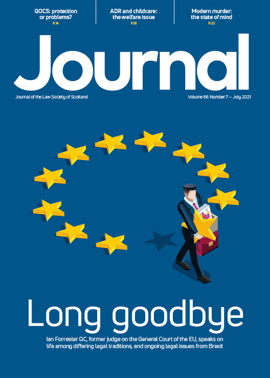QOCS: in force, but questions remain

In our online article in the March Journal, we discussed big changes for Scotland’s claims landscape, with the likely impact of qualified one-way costs shifting (QOCS) on personal injury practice. As anticipated, the court rules on QOCS have now been published, and took effect on 30 June 2021. The new rules apply to actions commenced after that date – and look set to raise both questions of interpretation and points of argument for pursuers and defenders alike.
Qualified one-way costs shifting
Section 8 of the Civil Litigation (Expenses and Group Proceedings) (Scotland) Act 2018 formed the basis for QOCS in Scotland, providing that where a person brings an action for personal injuries or death and has conducted the proceedings in an “appropriate manner”, the court must not make an award of expenses against that person, in respect of any expenses relating to the claim itself, or any appeal. This is a radical departure from the current practice which is, in the vast majority of cases, for expenses to be awarded to the successful party.
Exceptions to QOCS
The 2018 Act provides for three exceptions whereby a pursuer may not be considered to have conducted proceedings in an “appropriate manner”, and therefore may not benefit from the protection of QOCS. Under the Act, the pursuer will only be liable for the defender’s expenses in Scotland, where the pursuer:
- made “a fraudulent representation or otherwise acts fraudulently” in connection with the claim or proceedings;
- behaved in a manner which is “manifestly unreasonable” in connection with the claim or proceedings; or
- conducted the proceedings in a manner considered by the court to be “an abuse of process”.
The standard of proof for all three exceptions is the balance of probabilities.
Section 8(6) also provides that further exceptions may be specified by an Act of Sederunt. The Act of Sederunt (Rules of the Court of Session 1994, Sheriff Appeal Court Rules and Sheriff Court Rules Amendment) (Qualified One-Way Costs Shifting) 2021, laid before the Scottish Parliament on 1 June 2021, now provides for additional scenarios where QOCS will not apply, and a pursuer may be found liable for the defender’s expenses. These are:
- where the pursuer fails to obtain an award of damages greater than the sum offered by way of minute of tender;
- where there has been “unreasonable delay” by the pursuer in accepting a minute of tender;
- where the pursuer seeks to abandon the action, by way of decree of dismissal or decree of absolvitor in favour of the defender; or
- in sheriff court cases, where the defender is granted summary decree of absolvitor or dismissal against the pursuer.
Implications of new QOCS rules
The new provisions aim to add restrictions to the operation of QOCS. In the exceptions under the 2018 Act, any basis for arguing that QOCS should not apply rested solely on the behaviour of the pursuer. In contrast, the new rules, in allowing expenses to be recovered in cases where a minute of tender is not accepted (or, where there is a delay in acceptance), provide defenders with the ability to try and protect their costs and negotiate settlement.
Arguably, the rules add weight to minutes of tender. Ordinarily, both parties are susceptible to some risk on expenses throughout the course of a case, but when the new QOCS rules are applied, a minute of tender means the pursuer goes from the primary position of having no liability for expenses, to being potentially liable for the defender’s expenses from the date of tender.
There are some aspects of the rules that require further clarification, and which will undoubtedly form the basis of arguments in court regarding expenses. At first glance, there is an apparent inconsistency between the rules and the 2018 Act: under s 8 of the Act, a pursuer who takes their case to court, and does not succeed on the merits of their claim from a liability perspective, would be entitled to the protection of QOCS provided they have behaved reasonably. In contrast, a pursuer who is successful on the merits, but does not receive an award greater than a minute of tender, would not benefit from the protection of QOCS under the new rules. Other issues to be explored include, for example, what constitutes an “unreasonable delay” in accepting a tender. While the rules therefore provide some clarification on when defenders may apply to the court for QOCS to be disapplied, questions remain about how they will operate in practice.
Restrictions on expenses awarded against the pursuer
The new rules also address how expenses will be calculated, if a defender successfully argues that the pursuer should not benefit from QOCS protection in relation to a minute of tender.
The court has discretion to determine whether QOCS should be disapplied in any case, but if an award of expenses is allowed against the pursuer, there are a number of aspects taken into account:
- First, the pursuer’s liability in expenses cannot exceed the amount of expenses the defender has incurred after the date of the tender.
- Secondly, the pursuer’s liability in expenses is capped at 75% of the damages awarded to the pursuer.
If there is more than one defender, the cap of 75% applies to the total of all the defenders’ expenses as an aggregate sum, not to each defender’s expenses individually.
The rules specifically state that the figure of 75% will be calculated without offsetting any expenses due to the pursuer by the defender, before the date of the tender.
One question arising is how the 75% cap will apply to a minute of tender that is made gross of CRU. It is also not clear yet how an additional charge under the Taxation of Judicial Expenses Rules 2019 will be considered in this context. These questions require clarification and we can expect to see arguments being made on these points before the courts. - Thirdly, the rules specifically require the court to order that the pursuer’s liability in expenses does not exceed that 75% cap. This will apply even if the Auditor of Court assesses a greater sum being due, or if there has been any modification of an award of expenses.
This point is expressly made in the new rules, but at this stage it is unclear what this will add to the 75% cap rule set out above. Clarification by the courts is required to establish how this will operate in practical terms. - Finally, where there is more than one defender, the court will apportion the award of expenses recoverable between them, failing agreement between the defenders.
For now, it is unclear whether the defenders would be expected to have agreed a specific apportionment between them (e.g. 50/50), or simply to confirm to the court that they would be content to agree matters between them at a later date.
However, a word of caution to the defenders in such cases: if parties are left to discuss matters between themselves and no agreement can be reached, there will be no opportunity to return to court for a further hearing to decide the matter. The question of expenses in this scenario must be dealt with as part of the final disposal of the case – and after the final interlocutor, there is no going back.
What happens now?
QOCS will have a significant impact on personal injury cases in Scotland going forward. For pursuers and defenders alike, consideration should be given to the new exceptions provided for in the rules, particularly surrounding minutes of tender.
It is inevitable, given the potential questions of interpretation and the court’s discretion when applying the provisions of the 2018 Act and the new rules, that we will see expenses arguments on the application (and disapplication) of the QOCS provisions in the coming months and years. QOCS is happening, but this is by no means the end of the story.
Perspectives
Features
Briefings
- Civil court: Final judgment
- Licensing: The shadow of criminal convictions
- Tax: Towards global rules for global businesses
- Immigration: Deporting the reformed character
- Coronavirus Acts: What does the new bill keep in force?
- Property: PSG at 20: still going strong
- In-house: Dealing at the cutting edge







